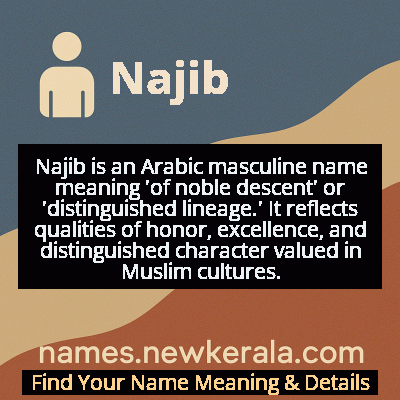Najib Name Meaning & Details
Origin, Popularity, Numerology Analysis & Name Meaning of Najib
Discover the origin, meaning, and cultural significance of the name NAJIB. Delve into its historical roots and explore the lasting impact it has had on communities and traditions.
Name
Najib
Gender
Male
Origin
Muslim
Lucky Number
9
Meaning of the Name - Najib
Najib is an Arabic masculine name meaning 'of noble descent' or 'distinguished lineage.' It reflects qualities of honor, excellence, and distinguished character valued in Muslim cultures.
Najib - Complete Numerology Analysis
Your Numerology Number
Based on Pythagorean Numerology System
Ruling Planet
Mars
Positive Nature
Generous, passionate, energetic, and humanitarian.
Negative Traits
Impulsive, impatient, moody, and can be overly emotional.
Lucky Colours
Red, maroon, scarlet.
Lucky Days
Tuesday.
Lucky Stones
Red coral, garnet.
Harmony Numbers
1, 2, 3, 6.
Best Suited Professions
Military, sports, philanthropy, leadership roles.
What People Like About You
Courage, energy, leadership, generosity.
Famous People Named Najib
Najib Razak
Politician
Sixth Prime Minister of Malaysia (2009-2018)
Najib Mikati
Businessman and Politician
Prime Minister of Lebanon (multiple terms)
Najib Mahfouz
Writer
Nobel Prize-winning Egyptian novelist (1988)
Najib Amhali
Comedian
Popular Dutch-Moroccan stand-up comedian and actor
Name Variations & International Equivalents
Click on blue names to explore their detailed meanings. Gray names with will be available soon.
Cultural & Historical Significance
In many Muslim cultures, naming a child Najib expresses parental aspirations for the child to embody noble qualities and achieve distinction in life. The name has been borne by scholars, leaders, and influential figures across the Muslim world, reinforcing its association with leadership and excellence. Its usage spans diverse regions including the Middle East, North Africa, South Asia, and Southeast Asia, demonstrating its widespread cultural resonance within the global Muslim community.
The name also reflects the importance of lineage and heritage in many Muslim societies, where family honor and reputation are highly valued. By choosing this name, parents invoke blessings and expectations for their child to continue or enhance the family's honorable standing while contributing positively to their community.
Extended Personality Analysis
Individuals named Najib are often perceived as possessing natural leadership qualities, confidence, and a dignified presence. They tend to carry themselves with an air of distinction and are frequently seen as ambitious, determined, and capable of achieving significant accomplishments. Their noble bearing often inspires respect from others, and they typically exhibit strong decision-making abilities and a clear sense of purpose in their endeavors.
Beyond their leadership qualities, those named Najib often demonstrate intellectual curiosity, refined tastes, and a preference for quality over quantity in all aspects of life. They are usually articulate communicators who value meaningful relationships and maintain high standards in both personal and professional contexts. While they may appear reserved initially, they typically prove to be loyal friends and family members who take their responsibilities seriously and strive to uphold the honorable reputation associated with their name.
Many Najibs display a natural elegance in their mannerisms and approach to life, often showing appreciation for art, culture, and intellectual pursuits. They tend to be strategic thinkers who plan carefully before acting, and they usually possess the resilience to overcome challenges while maintaining their composure and dignity. Their combination of intelligence, determination, and inherent nobility makes them well-suited for leadership roles and positions of responsibility.
Modern Usage & Popularity
In contemporary times, Najib remains a popular choice among Muslim families worldwide, particularly in Arabic-speaking countries, Malaysia, Indonesia, and Muslim communities in Western nations. While its popularity has seen some fluctuation, it maintains steady usage due to its strong cultural and religious significance. The name is particularly favored by parents who wish to instill values of nobility, distinction, and leadership in their sons. In recent decades, the name has gained additional visibility through prominent political figures bearing the name, contributing to its continued relevance in modern Muslim naming practices. The name maintains a classic appeal while adapting well to contemporary global contexts, making it a timeless choice that bridges tradition and modernity.
Symbolic & Spiritual Meanings
Symbolically, Najib represents more than just noble lineage—it embodies the aspiration for moral excellence, intellectual distinction, and leadership qualities. The name carries connotations of refined character, wisdom, and the ability to rise above ordinary circumstances. In metaphorical terms, it suggests someone who is destined for greatness, possessing innate qualities that set them apart while maintaining humility and integrity. The symbolic weight of the name encourages the bearer to live up to its meaning through honorable actions, ethical conduct, and meaningful contributions to society. It represents the ideal of using one's talents and position for the betterment of others while maintaining personal dignity and moral compass.

